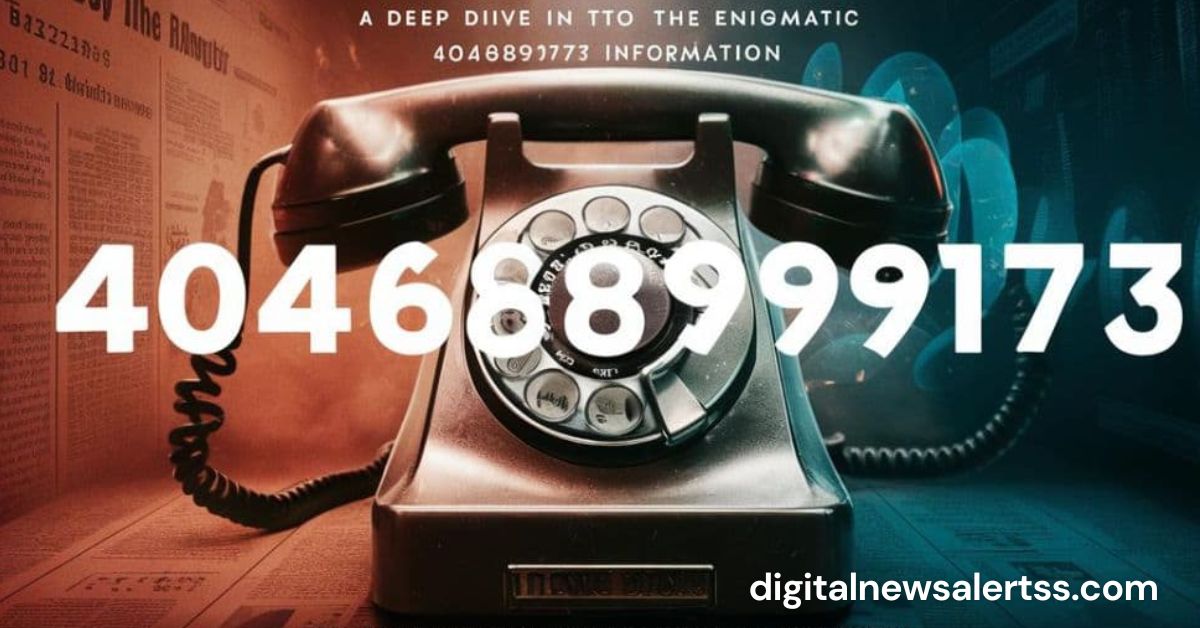The number 4046899173 might seem like just another random sequence, but it could be a cause for concern. This number has been associated with potential scam calls, phishing attempts, and other fraudulent activities. With the increasing number of scams and frauds happening through phone calls, understanding how to identify and protect yourself from such threats is crucial.
In this article, we will dive deep into understanding the significance of this number, common scam techniques used by fraudsters, how to identify suspicious calls, and the steps you can take to protect yourself and your personal information.
What is 4046899173?
4046899173 is a phone number that has been reported in connection with various fraudulent activities. Scammers often use random phone numbers to trick individuals into providing personal information, sending money, or gaining access to sensitive data. These scams can vary in nature, including impersonating government agencies, tech support, or even pretending to be a relative in distress.
Why is 4046899173 Significant?
This number has been specifically flagged due to reports of suspicious activities. Scammers using this number might attempt to:
- Gain access to your personal and financial information.
- Trick you into sending money through wire transfers or gift cards.
- Install malware on your device by prompting you to visit a malicious website.
Understanding the potential threats associated with numbers like 4046899173 is essential to stay vigilant and protect yourself.
Common Types of Phone Scams
Scammers use various tactics to deceive people. Here are some common types of phone scams you should be aware of:
1. Impersonation Scams
These scams involve the caller pretending to be someone from a legitimate organization, such as:
- Government Agencies: Claiming to be from the IRS, Social Security Administration, or FBI.
- Tech Support: Pretending to be from Microsoft, Apple, or other tech companies, warning you of a virus on your computer.
- Financial Institutions: Claiming to be from your bank, asking for account verification.
2. Lottery and Prize Scams
In these scams, the caller tells you that you’ve won a large sum of money or a prize but requires you to pay a fee or provide personal information to claim it.
3. Emergency Scams
The scammer pretends to be a friend or family member in trouble, asking for immediate financial assistance. They often create a sense of urgency to pressure you into acting quickly.
4. Phishing Calls
These calls aim to trick you into providing personal or financial information. The scammer may pose as a representative from a bank or credit card company, asking you to verify account details.
5. Robocalls
Automated calls that deliver pre-recorded messages, often about bogus services or products. Some robocalls might even threaten legal action if you do not comply with their demands.
Recognizing Scam Calls
Recognizing a scam call is the first step in protecting yourself. Here are some red flags to look out for:
1. Unsolicited Calls
If you receive a call from 4046899173 or any other number that you don’t recognize and you haven’t given them permission to contact you, be cautious.
2. Urgency and Threats
Scammers often create a sense of urgency to pressure you into making a quick decision. They might threaten legal action, arrest, or other consequences if you don’t comply immediately.
3. Request for Personal Information
Legitimate organizations will not ask for sensitive information like your Social Security number, bank account details, or passwords over the phone.
4. Untraceable Payment Methods
Be wary if the caller asks for payment through wire transfers, prepaid debit cards, or gift cards. These methods are difficult to trace and are commonly used by scammers.
5. Too Good to Be True Offers
If the caller offers something that sounds too good to be true, like winning a lottery or receiving a grant, it’s likely a scam.
Protecting Yourself from Phone Scams
Knowing how to protect yourself from phone scams can save you from potential financial loss and identity theft. Here are some steps you can take:
1. Do Not Answer Unknown Numbers
If you receive a call from an unknown number like “4046899173,” let it go to voicemail. Scammers rarely leave messages, and if they do, it often includes telltale signs of fraud.
2. Verify the Caller
If the caller claims to be from a legitimate organization, hang up and contact the organization directly using a verified phone number. Do not use the number provided by the caller.
3. Do Not Share Personal Information
Never provide personal or financial information over the phone unless you are sure of the caller’s identity.
4. Use Call Blocking Services
Many phone companies offer services to block suspected scam calls. There are also third-party apps available that can identify and block scam numbers.
5. Register on the Do Not Call List
Registering your number on the National Do Not Call Registry can reduce the number of unwanted calls you receive. While it won’t stop all scam calls, it can help filter out some of them.
6. Educate Yourself and Others
Stay informed about the latest scam tactics and educate your friends and family. The more people are aware of these scams, the less effective they become.
Steps to Take if You’ve Been Scammed
If you suspect that you’ve been scammed or have provided personal information to a scammer, take immediate action:
1. Contact Your Bank
Notify your bank or credit card company if you believe your financial information has been compromised. They can help secure your accounts and prevent unauthorized transactions.
2. Report the Scam
Report the incident to the Federal Trade Commission (FTC) at ftc.gov/complaint. You can also file a report with the local police and the FBI’s Internet Crime Complaint Center (IC3).
3. Monitor Your Accounts
Keep a close eye on your bank accounts, credit cards, and credit reports for any unusual activity. Consider placing a fraud alert or a credit freeze on your credit reports.
4. Change Your Passwords
If you provided any passwords or login information, change them immediately. Use strong, unique passwords for each of your accounts.
5. Warn Others
Share your experience with friends, family, and on social media to warn others about the scam and help prevent others from falling victim.
FAQs about 4046899173 and Phone Scams
What should I do if I receive a call from 4046899173?
If you receive a call from 4046899173 or any other suspicious number, do not answer it. If you do answer, do not provide any personal information. Hang up immediately and report the number to the FTC.
Can I block the number 4046899173?
Yes, you can block the number on your phone. Most smartphones have a built-in feature to block specific numbers. You can also use third-party apps to block known scam numbers.
Q3: How do scammers get my phone number?
Scammers obtain phone numbers through various means, including data breaches, public directories, or even by randomly generating numbers. They often use automated systems to call large numbers of people.
Can I trust caller ID information?
No, caller ID information can be easily spoofed. Scammers can make it appear as though they are calling from a legitimate organization or a local number when they are not.
Is 4046899173 a legitimate phone number?
While 4046899173 is a real phone number, it has been associated with scam activity. Always exercise caution when receiving calls from unfamiliar numbers.
How can I report a scam call?
You can report scam calls to the Federal Trade Commission (FTC) at ftc.gov/complaint and to your phone service provider. Reporting helps authorities track and prevent scams.
What should I do if I’ve already given out my information to a scammer?
If you suspect that you’ve provided personal information to a scammer, contact your bank or credit card company immediately. You should also monitor your accounts for any suspicious activity and report the incident to the FTC.
Are all calls from unknown numbers scams?
Not all calls from unknown numbers are scams. Some legitimate organizations or individuals might call you from numbers you don’t recognize. However, it’s essential to be cautious and verify the caller’s identity before providing any information.
Conclusion
Receiving a call from 4046899173 or similar numbers can be alarming, especially when scammers use these calls to trick people into giving away personal information or money. By understanding how these scams work and knowing how to protect yourself, you can reduce the risk of falling victim to these fraudulent activities.
Always remember to be cautious when dealing with unknown numbers, verify the caller’s identity, and never share personal information over the phone unless you are sure of whom you are speaking to. If you suspect a scam, report it to the appropriate authorities to help protect yourself and others.



